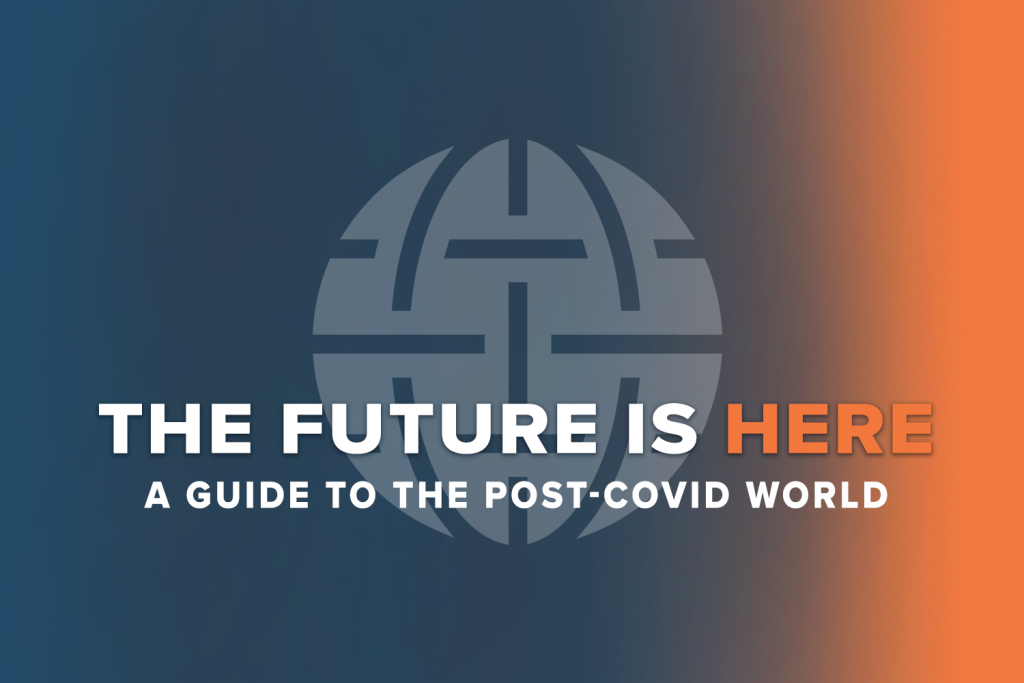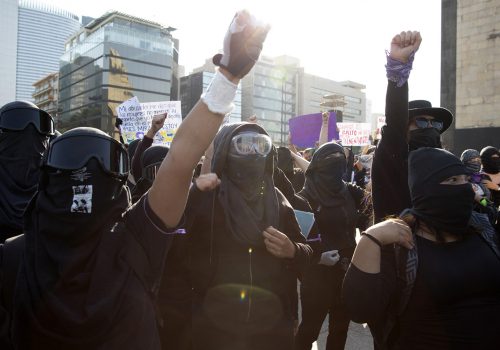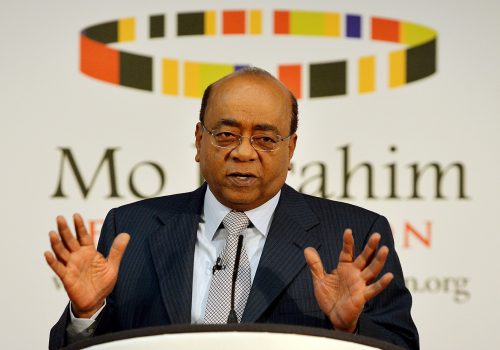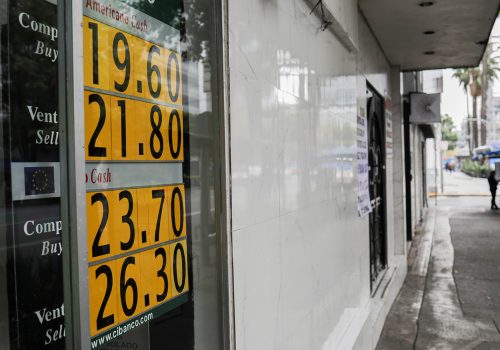The future is here: A guide to the post-COVID world 12/18/2020
Welcome to your guide to where the world is headed during the pandemic era and beyond. Each week, we’ll bring you the latest and most significant expert insights and international news about how coronavirus is reshaping international affairs. To stay updated each week, sign up to the newsletter here.
A quick note: In recognition of the holidays, we won’t release a new edition of The Future Is Here for the next couple weeks, but we’ll be back in your inbox on January 8, 2021.
Let’s take a spin around the globe, in seven minutes or less.
In top stories this week:
- More vaccines are on the way, but that also means more logistical hurdles for governments.
- Barley, beef, and wine are the most recent victims of Australia’s pandemic-fueled trade spat with China.
- The World Health Organization is dispatching scientists to solve this era’s biggest mystery: What exactly caused the pandemic?
- But first, we have a special dispatch from the Atlantic Council’s managing editor, Uri Friedman. Here’s his take on this week’s big story.
The big story
This week’s key theme: COVID-19 is redefining national power
By all the traditional metrics of state power—defense spending, gross domestic product, population size—the United States clearly qualifies as a superpower. But all that clout has counted for surprisingly little in the struggle against COVID-19. The United States is grappling with one of the world’s worst outbreaks and recently came in eighteenth in a Bloomberg ranking of leading economies according to how effectively they’ve dealt with coronavirus and minimized its damage to the economy and society.
There’s a lesson in this paradox. As I wrote in a recent column for The Atlantic, the pandemic has revealed the importance of “resilient power,” which I define as “a country’s capacity to absorb systemic shocks, adapt to these disruptions, and quickly bounce back from them”—ideally in better shape than before.
In the post-COVID era, I argue, each nation’s geopolitical power will stem at least in part from its resilient power given the complex, transnational challenges that will shape the twenty-first century—pandemics, yes, but also climate change, financial crises, disinformation campaigns, and cyberattacks. For a sign that the premium on resilient power will outlast the COVID crisis, just consider this week’s alarming revelations regarding the suspected Russian hacks of US federal agencies.
Subscribe to The future is here: A guide to the post-COVID world
Sign up for a weekly roundup of top expert insights and international news about how coronavirus is reshaping international affairs.

Resilience: a new, disruptive force in geopolitics
The pandemic has shown that resilient power comes in various forms, though one common theme is that it depends on the technocratic capacity of, and particularly public trust in, the government and its leaders.
A year into the COVID crisis, the world’s major powers remain its major powers and middle powers remain its middle powers. But those nations that have demonstrated exceptional resilience have become more influential players—from the rise of New Zealand as a global leader in resilient governance to the role various middle powers have played in joint financial responses to the global economic downturn and international efforts to disseminate vaccines. The United States, meanwhile, has suffered serious economic and reputational blows.
The bottom line: Just because the US has sustained these blows doesn’t mean it can’t still become a more resilient power by embracing new policies and paradigms for governing. The arrival of vaccines offers a new opportunity to bounce back from the COVID crisis. As the resilience expert Michele Grossman told me, “resilience is not the absence of vulnerability” but rather “the ability to manage” vulnerabilities so they don’t “overwhelm us.”
The world in brief
Insights from across the planet, in ten bullets or fewer
- Christmas plans hang in the balance. The World Health Organization is encouraging families to gather outside if possible and otherwise urging people to wear masks inside and practice social distancing, the BBC reports. Germany just imposed stringent curbs that include the closure of most stores, while Wales and Scotland broke ranks from a four-nation approach to UK restrictions during the holiday season by tightening curbs. Meanwhile, Holland has set its toughest curbs yet over the festive period.
- QUOTE: Loosening restrictions over Christmas could mean “a blunder into another major error” that would “cost many lives,” the BMJ and the Health Services Journal said in a joint editorial, only the second in the journals’ histories, the Financial Times reports. “Rather than lifting restrictions over Christmas as currently planned, the UK should follow the more cautious examples of Germany, Italy and the Netherlands,” the editorial reads.
- The vaccine arsenal is increasing, but that doesn’t mean the challenges are disappearing. A second vaccine looks set to join the fight against coronavirus in the United States, as the US Food and Drug Administration found Moderna’s shot “highly effective,” laying the ground for an emergency authorization, The Wall Street Journal says. Shots of the Pfizer vaccine, approved in the United States on December 11, were quarantined in California and Alabama as the vials were stored in temperatures that were too cold, CNBC reports, highlighting the logistical challenges of ultra-cold storage requirements.
- A UK watchdog tallied up vaccine costs, and the government is ready to write a big check. COVID-19 vaccinations will cost the United Kingdom up to £11.7 billion, Bloomberg reports, citing estimates from the country’s public-spending watchdog. The UK has signed deals for five different vaccines providing as many as 267 million doses, the newswire adds. Meanwhile researchers have been using the video-sharing social network TikTok to provide reassurance about the safety of COVID-19 vaccines, the BBC reports.
- Are vaccines the gateway to renewed travel and leisure activities? Industries including airlines are experimenting with digital immunity certificates as the world embarks on the biggest mass-vaccination drive ever seen, Bloomberg Businessweek reports. As vaccines are doled out in the coming months and the pandemic begins to wind down, the logistical, legal, and technological challenges that governments and corporations will face are without precedent, it adds.
- QUOTE: “The COVID-19 pandemic is meeting many of the worst expectations that public health experts in the U.S. and Europe had for fall and winter,” Justin Fox writes for Bloomberg. “There’s one thing they worried about that doesn’t seem to be happening, though: a devastating ‘twindemic‘ of COVID and seasonal influenza.”
- The US Congress inches toward a stimulus deal. A $900 billion pandemic relief bill may be announced before the US government shuts down on December 19 and 12 million Americans lose unemployment benefits a week later, CNBC reports. Much of the country’s economic health depends on a new injection of government aid following months of wrangling in a divided Congress, Bloomberg Businessweek says. The US economy is still in suspended animation, experiencing a “zombie recovery,” as falling retail sales last month show that the recovery may be losing ground, Bloomberg adds.
- The China-Australia trade spat is worsening over locating the source of the pandemic. Australia is referring China, its biggest trading partner, to the World Trade Organization because Beijing imposed punitive tariffs on barley, the Financial Times reports. Beijing also imposed sanctions on imports of beef and wine after Canberra called for a probe into the origins of the COVID-19 pandemic that first emerged in the Chinese city of Wuhan, the newspaper adds. Australian Trade Minister Simon Birmingham said China’s diplomatic treatment of Australia was unacceptable, The Sydney Morning Herald reports. There’s an upside for lobster fans: With curbs on exports to China, the price of lobsters has plummeted at home—so much so that supermarkets have imposed purchase limits.
- The WHO plans to dive deeper into the pandemic’s origins. An international team of ten scientists will travel to Wuhan next month to investigate the origins of COVID-19, the WHO says. While China hasn’t opposed an investigation, the global health body has been negotiating for access for months, the BBC reports. It’s thought that the virus came from a market selling animals in the city, it adds.
- QUOTE: “We cannot afford to exclude the world’s lower-income countries from the economic recovery,” Gordon Brown, a former UK prime minister, says in the Financial Times, calling for an emergency Group of Twenty summit in February. Next year, 2021, may be the year of mass vaccination, “[b]ut we should not confuse that with the sustained global recovery the world needs.”
- The pandemic in photos. The Associated Press reviewed 2020 in photos, with the pandemic chief among the main themes. One image depicts female clerics in Iran who covered themselves from head to toe with protective clothing and gas masks to prepare a body for burial, while another shows a couple in their eighties embracing through a plastic curtain in Spain. In addition to images of grief and photos of the dead, there is lightness too. Photos showing a man in Iran playing the double bass in his backyard while self-isolating, along with pre-pandemic hugs and laughter during a musical conga in Cuba, serve as a reminder that better times may lie ahead in 2021.
The inside scoop
Insights from the Atlantic Council



